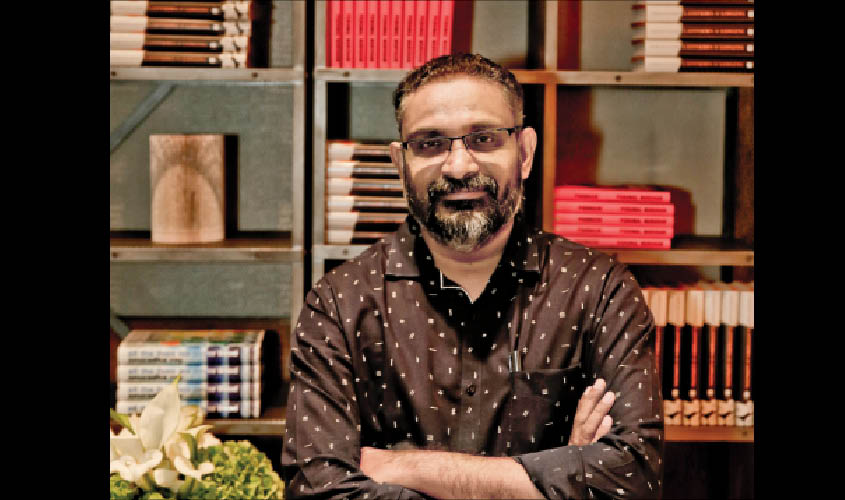Malayalam author Benyamin, whose novel Jasmine Days recently won the JCB Prize for Literature, speaks to Bhumika Popli about how writing can be used to explore socially-relevant themes.
Q. Tell us about your initial days as a writer. Was there a lot of struggle involved?
A. To become a writer was not my dream or ambition at all during my school or college days. But when I went to the Gulf at the age of 21, I felt sudden loneliness, alienation and identity crisis. From there onwards I started serious reading and found my real self in it. After an eight-year-long period of reading, I realised I too have stories within me to tell the world. It was unique and new to Malayalam literature. So they accepted me easily. Publishing stories in magazines or books was not a huge barrier for me. I never struggled for publishers. Now I think all that just happened like in a dream.
Q. Your latest novel, Jasmine Days, which won the JCB Prize for Literature, is set in a Gulf country. How did you go about developing the theme of identity within that narrative?
A. It is so complicated in a Gulf country. If we migrate to any other country in the world, we may become part of that society somehow. But in the Gulf countries, we will be on the other side of the wall, and the years we have spent in that place are not taken into consideration. The first generation may overcome this with nostalgic memories and the feeling of bonding with family. But the second generation might face a dilemma. The question “Who am I?” will haunt them. In the novel, [the protagonist’s sister] Farhana’s thoughts and actions reflect this well. [The story] is about an expatriate. Inside any society, what a person feels about being part of a minority group is much more complicated than what we understand. That is the story I am trying to tell.
Q. The novel’s protagonist, Sameera is a radio jockey. What made you choose this particular profession for this character?
A. Firstly, it is the duty of a writer to ensure that he grabs the attention of his readers. To generate interest in the subject he really wishes to talk about. Secondly, I believe music is a good medicine for any type of pain or agony. The characters in the novel pass through many painful situations. Music plays the role of pacifying them. Thirdly, in the Gulf countries, radio is an influential medium, at least for expatriates, and it is a companion to many who live alone in distant desert villages.
Q. How did you manage to delve into the complex psychology of the protagonist, who, as a child, assumes her father to be a “visiting monster”, and later begins to feel deep compassion for him?
A. This comes from many of my friends who had the same experience in their families. I got the idea from a father; I just projected on a daughter. That’s all.
Q. Your novel combines the forms of journalistic reportage and fiction. What kind of research did you do for this project?
A. Life always inspires me. If something is stuck in my heart, I will follow it as much as I can. I will try to meet people and collect first-hand information and experiences. Then I will search for incidents related to the subject in newspapers, other documents and then in history books. This also has two stages—there will be an initial collection [of data], and then, in the middle of the writing process, each paragraph may need more clarification or authenticity, which requires further research.
Q. Was it difficult to write the novel in the voice of a woman?
A. Readers have a tendency to assume the “I” (first person) in the novel is the gender of the writer. When “he” is writing in “her” voice, it may complicate the reading. That’s why I fictionalised it, as the words were “written” originally by Sameera Parveen [the protagonist] and merely translated by me. Another part is reading “her” mind from “his” point of view. That I overcome with observation.
Q. In the writing of this novel, what sort of growth or power did you attain as a writer?
A. If you feel empathy for the loser, the power will come to you automatically. I always asked myself, “Why do you write?” The answer would be in the form of a relevant question which god asked in the Holy Bible: “Where is your brother?” Writing is an earnest attempt to find the answer to this question. Every serious novel conducts an inquiry into a marginalised group of brethren among us and tries to document it.
Q. What are your views on the freedom of press today? Has it become an outdated concept?
A. Absolutely. All media is biased due to some hidden agenda. It may be controlled by governments, political parties, cooperate groups or religious institutions. They all have their own interests and interpretations.
Q. You write in Malayalam. Could you introduce us to some of the best contemporary works in Malayalam literature?
A. There are many. Preface to Manby Subhash Chandran;Hang Women by K.R. Meera; Francis Itty Cora by T.D. Ramakrishnan; Island of Lost Shadows by E. Santhosh Kumar; and Acid by Sangeetha Sreenivasan are some of them.

